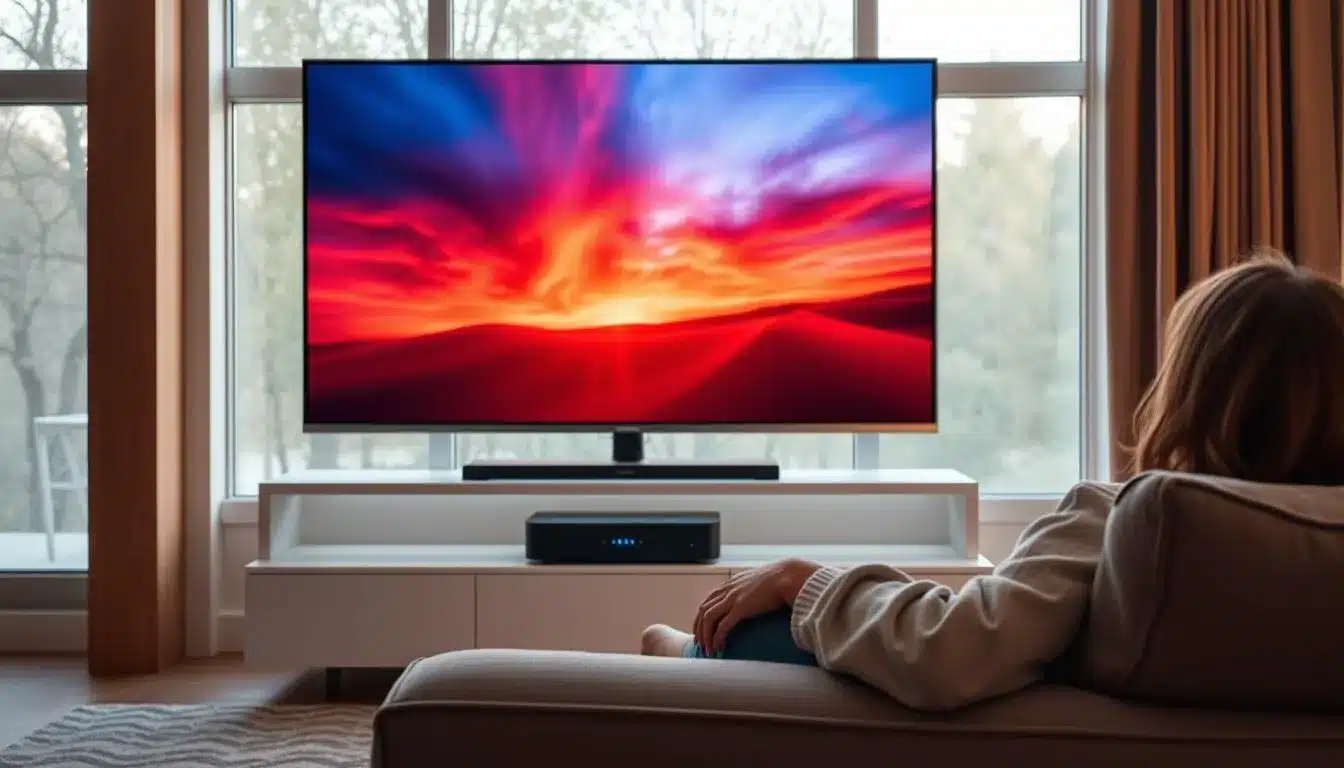Imagine watching your favorite show or live sports without any interruptions. A seamless IPTV experience is what you expect. But, buffering can ruin it.
Buffering can be really frustrating, especially during key moments. You need an IPTV subscription with no buffering for a smooth watch.
A buffer-free experience is more than just convenient. It’s about enjoying content as it’s meant to be seen. With the right service, say goodbye to buffering and hello to a smooth, uninterrupted viewing experience.
The Reality of IPTV Streaming Today
IPTV has changed how we watch TV, giving us more control and flexibility. It’s important to know how it works, its challenges, and why people want a smooth viewing experience.
What Is IPTV and How Does It Work?
IPTV delivers TV over the internet, not through satellite or cable. It lets you watch what you want, when you want, on your device. You get lots of channels, on-demand shows, and catch-up TV.
It works by turning TV signals into internet packets. These packets travel over the internet. So, you can watch lots of content from anywhere, as long as you have internet.

Common Challenges Viewers Face with Streaming
Even with IPTV’s benefits, viewers face some big challenges. Buffering is a big one, where streaming pauses to load data. This can happen for many reasons, like slow internet, too many users, or device problems.
Finding a reliable IPTV service is key for smooth streaming. The quality of your stream depends on your provider and their setup.
The Growing Demand for Buffer-Free Entertainment
More people want buffer-free IPTV subscription services. They want streaming that’s seamless and high-quality. With more streaming options, viewers are pickier, looking for services that deliver without breaks.
This demand is pushing IPTV providers to improve. They’re investing in better tech to give us uninterrupted streaming. So, the future of IPTV looks bright, with more reliable and quality options coming our way.
Understanding Why IPTV Buffering Occurs
To enjoy uninterrupted IPTV, it’s important to know why buffering happens. IPTV uses the internet to stream content. If the internet connection is slow or unstable, buffering occurs, ruining the viewing experience.

Technical Causes Behind Streaming Interruptions
Several technical factors cause IPTV buffering. A slow or unstable internet connection is a big problem. It can’t handle the data needed for smooth streaming. Also, issues with the IPTV server, like overload or maintenance, can cause buffering.
Another key factor is your network configuration. If it’s not set up right or other devices are using too much bandwidth, it can slow you down. Making sure your network is set up for IPTV streaming is key for a high-quality IPTV subscription.
- Insufficient internet speed
- Network congestion
- Server overload
- Improper network configuration
How Data Packets Affect Your Viewing Quality
Data packets are the foundation of IPTV streaming. When you ask for content, it’s split into packets and sent over the internet. If these packets are delayed or lost, you get buffering. The quality of your IPTV subscription depends on how well these packets are delivered.
A premium IPTV subscription usually has optimized servers and network protocols. These help reduce packet loss and delay, making streaming smoother.
“The efficiency of data packet delivery is crucial for uninterrupted IPTV streaming.”
Expert in IPTV Technology
The Relationship Between Stream Quality and Buffering
The stream quality affects buffering. High-definition streams need more bandwidth and faster speeds. If your connection can’t handle it, you’ll get buffering. Picking the right IPTV subscription with no buffering means choosing one that fits your internet speed.
Many IPTV services use adaptive bitrate streaming. This adjusts the stream quality based on your internet speed. It helps reduce buffering by lowering the stream quality when needed.
- High-definition streams require more bandwidth.
- Adaptive bitrate streaming adjusts quality based on internet speed.
- A stable internet connection is crucial for high-quality streaming.
The Impact of Buffering on Different Viewing Scenarios
Buffering can ruin your viewing experience, whether it’s live sports or movie nights. It’s especially frustrating when watching your favorite content via IPTV. The impact of buffering changes a lot depending on what you’re watching.
Live Sports Events: When Every Second Counts
For live sports, every second is crucial. Uninterrupted IPTV streaming is key for fans who want to keep up with the action. Buffering can make you miss important moments, like goals or touchdowns. This can ruin your sports experience.
To avoid missing out, you need a reliable IPTV service. A seamless IPTV experience is essential. Studies show many sports fans stop using streaming services because of buffering https://d-nb.info/1067385819/34.

Movie Nights: Maintaining Immersion Without Interruptions
Movie nights are also affected by buffering. It can break the spell of a good film. To keep the movie magic alive, uninterrupted IPTV streaming is crucial.
Here are some tips for a buffering-free movie night:
- A stable internet connection
- A reliable IPTV provider
- Properly configured streaming devices
Choosing thebest IPTV provider can greatly improve your movie nights.
TV Series Marathons: Consistent Quality for Extended Viewing
TV series marathons need consistent quality over a long time. Buffering can be especially annoying during these sessions. To enjoy your shows without breaks, you need a service that offers seamless IPTV experience.
Here are some tips for TV series marathons:
- Make sure your internet can handle long streams
- Use a high-quality streaming device
- Choose an IPTV service with a strong network
By focusing on these points, you can reduce buffering and enjoy your TV series marathons without interruptions.
Critical Factors That Determine Streaming Quality
Getting a smooth IPTV experience depends on several key factors. These factors are important for enjoying your favorite shows without interruptions.
A reliable IPTV service is the base for a great viewing experience. This starts with your internet connection.
Internet Connection Requirements for Buffer-Free Viewing
Your internet connection must meet certain requirements for smooth IPTV. For standard definition (SD) content, a 25 Mbps download speed is needed. High-definition (HD) content requires at least 50 Mbps, and 4K content needs speeds over 100 Mbps.
It’s not just about speed. The stability and latency of your connection are also crucial. A stable connection with low latency helps ensure smooth data delivery, reducing buffering.
As streaming services evolve, faster and more reliable internet will be needed. Make sure your ISP can meet these demands.
Server Infrastructure and Its Impact on Performance
The quality of the IPTV service provider’s servers is also key. A top-rated IPTV service has strong servers that handle many users without performance drops.
Server quality impacts streaming in several ways:
- Processing power: Good processing ensures efficient content encoding and streaming.
- Storage capacity: Enough storage is needed for a large content library.
- Network connectivity: Quality network connections between servers and clients are crucial for smooth streaming.
A well-maintained server infrastructure is vital for a buffer-free IPTV subscription. It directly affects service quality and reliability.
Geographic Distance to Servers and Content Delivery Networks
The distance between you and the IPTV servers can affect streaming quality. The farther you are, the more latency and buffering you might experience.
Content Delivery Networks (CDNs) help solve this problem. CDNs store content at various global locations, reducing streaming distance.
“CDNs are a crucial component in delivering high-quality IPTV services, as they help reduce latency and improve streaming quality.” – IPTV Industry Expert
By understanding and addressing these factors, you can greatly improve your IPTV experience. Enjoy a seamless and buffer-free entertainment experience.
IPTV Subscription with No Buffering: What to Look For
To enjoy IPTV without buffering, knowing what to look for is key. The quality of the service provider greatly affects your experience. It’s important to understand the essential components for a smooth viewing experience.
Essential Features of High-Performance IPTV Services
High-performance IPTV services have key features that improve your viewing experience. Reliable streaming is crucial, offering consistent, high-quality video. Also, having a wide range of channels and on-demand content is important.
A user-friendly interface makes it easy to find and watch content. The best services also support multiple devices, so you can watch on different devices.
Evaluating Provider Reliability and Infrastructure
The reliability of an IPTV provider depends on their infrastructure. A strong infrastructure includes high-capacity servers and a well-maintained content delivery network (CDN). A well-placed CDN can reduce latency and improve stream quality.
When choosing a provider, check their server locations and technology. Providers using the latest streaming technologies are more likely to offer a buffer-free experience.
Bandwidth Allocation and Stream Stability Guarantees
Bandwidth allocation is key to IPTV streaming quality. Providers that allocate enough bandwidth ensure a stable and high-quality experience. Some services offer stream stability guarantees, promising quality and uptime.
It’s important to ask about bandwidth allocation and stream stability policies. This information is often in their service level agreements (SLAs) or FAQs.
Customer Support for Technical Issues
Even with the best IPTV services, technical issues can happen. Efficient customer support is vital for quick issue resolution. Look for providers with multiple support channels, like live chat, email, and phone.
A responsive customer support team can greatly improve your IPTV experience. They can quickly address your concerns and minimize downtime.
Legal Considerations When Choosing IPTV Providers
It’s also important to consider the legal aspects of your IPTV subscription. Make sure the provider has the necessary licensing agreements for their content. Using pirated content can lead to legal trouble.
Research the provider’s legal standing and reputation. A legitimate IPTV service will have clear policies and comply with copyright laws. This ensures a safe and legal viewing experience.
Optimizing Your Home Setup for Uninterrupted Streaming
To enjoy uninterrupted IPTV streaming, optimizing your home setup is key. A well-configured home network is essential for a seamless IPTV experience. It makes sure your streaming devices get the bandwidth they need for high-quality video.
Network Configuration for Maximum IPTV Performance
Setting up your network for IPTV means choosing the right connection and router setup. A wired connection is more stable than Wi-Fi, which helps avoid buffering.
Wired vs. Wireless: Making the Right Connection Choice
A wired Ethernet connection is fast and stable, perfect for IPTV. But if you like the freedom of Wi-Fi, make sure your router is set up for the best performance.
| Connection Type | Stability | Speed |
|---|---|---|
| Wired (Ethernet) | High | High |
| Wireless (Wi-Fi) | Moderate | Variable |
Router Placement and Quality Considerations
The place and quality of your router greatly affect your IPTV streaming. Putting your router in the middle and getting a high-quality one can boost your network’s performance.
Bandwidth Management Techniques
Managing bandwidth well is key for a reliable IPTV service. By giving IPTV traffic priority and controlling device use, you can stop buffering.
QoS Settings to Prioritize Streaming Traffic
Quality of Service (QoS) settings on your router let you give more bandwidth to IPTV devices. This ensures a smooth streaming experience.
Managing Multiple Devices on Your Network
Limiting devices on your network or setting aside bandwidth for IPTV can keep your connection stable.
VPN Solutions: When They Help and When They Don’t
Using a VPN can sometimes improve your IPTV experience by getting around geo-restrictions. But it can also add latency, which might cause buffering.
By optimizing your home setup with these tips, you can enjoy a best IPTV provider experience with few interruptions. Whether it’s live sports or your favorite TV series, a well-set-up network means a smooth viewing experience.
Hardware Solutions for Buffer-Free IPTV Experience
Hardware is key to a good IPTV streaming quality. To get a buffer-free IPTV subscription, knowing how hardware helps is crucial.
Choosing the right hardware for IPTV involves several factors. First, find top streaming devices known for smooth playback. Smart TVs, streaming sticks like Google Chromecast or Amazon Fire TV, and IPTV boxes are top picks.
Top Streaming Devices That Deliver Smooth Playback
Top streaming devices handle high-bandwidth streams well. Look for devices that support 4K and HDR for a better experience. Make sure the device works well with your IPTV service and stream quality.
- Smart TVs with built-in IPTV apps
- Streaming sticks like Roku or Google Chromecast
- Dedicated IPTV boxes with advanced processors
As experts suggest, solving IPTV freezing or sound issues often involves checking your hardware capabilities.
Device Specifications That Matter for IPTV Performance
The performance of your IPTV streaming device depends on its specs. Key specs include processor speed, RAM, and storage type. A device with a fast processor and enough RAM handles demanding streams better, reducing buffering.
| Device Specification | Importance for IPTV |
|---|---|
| Processor Speed | High |
| RAM | Medium to High |
| Storage Type | Medium |
Storage and Processing Power Requirements
For a high-quality IPTV subscription, you need enough storage and processing power. Faster storage like SSDs load content quickly. A strong processor ensures smooth playback.
“The right hardware can significantly enhance your IPTV experience, providing a buffer-free and enjoyable viewing experience.” – IPTV Expert
By choosing the right hardware and understanding its specs, you can greatly improve your IPTV experience. This ensures a top-rated IPTV service works as promised.
Software Optimization for Seamless IPTV Viewing
Getting a smooth IPTV experience is more than just fast internet. It also needs software tweaks. To enjoy your IPTV subscription with no buffering, you must adjust your software settings.
Choosing the right media player is key. Some players work better for IPTV than others.
Best Media Players for Stable IPTV Streaming
Not all media players are the same for IPTV. Here are some top picks for stability and performance:
- Kodi: It’s versatile and has many add-ons, making it a favorite for IPTV users.
- IPTV Smarters: This app is easy to use and has features like EPG and multi-screen support.
- VLC Media Player: It’s strong and supports many streaming protocols, including IPTV.
Choosing the right media player is just the start. Setting it up right is also crucial.
Buffer Settings and Caching Configurations
Buffer settings and caching are key for smooth IPTV. Tweaking these can help avoid buffering:
| Setting | Description | Impact on IPTV |
|---|---|---|
| Buffer Size | Determines how much data is stored before playback starts | A bigger buffer can cut down buffering but might slow down playback |
| Caching | Stores data for quick access | Good caching can make streams more stable |
Try different buffer sizes and caching settings to find what works best for you.
App-Specific Optimizations for Popular IPTV Clients
Different IPTV clients need different tweaks. Some apps let you adjust stream quality or buffer size. Knowing these settings can improve your IPTV experience:
“Optimizing your IPTV client settings can make a big difference. It’s worth checking the settings menu to find the best settings for you.”
IPTV Expert
For a premium IPTV subscription, using app-specific optimizations can boost your service’s performance.
By focusing on software optimization, you can greatly improve your IPTV experience. Enjoy a seamless IPTV experience with fewer interruptions.
Advanced Troubleshooting for Persistent Buffering Issues
Persistent buffering can really mess up your IPTV experience. But, with the right steps, you can get back to uninterrupted IPTV streaming. When simple fixes don’t work, it’s time to get into more advanced troubleshooting.
Diagnostic Approaches to Identify the Root Cause
To fix buffering, first find the main problem. Check your internet speed to make sure it’s good enough for reliable IPTV service. Use online tools to test your bandwidth.
Also, look at your network setup. Make sure your router is set up right. And, check if other devices are using too much bandwidth, which might slow down your IPTV stream.
Step-by-Step Solutions for Common Buffering Scenarios
After finding possible causes, you can start fixing them. If your internet speed is too low, think about getting a faster plan or improving your network.
- Check for physical obstructions or interference affecting your Wi-Fi signal.
- Update your router’s firmware to the latest version.
- Use Quality of Service (QoS) settings to prioritize IPTV traffic.
If you’re with a best IPTV provider, check if their service is down or being updated. This could be causing your buffering.
When and How to Escalate Technical Issues to Your Provider
If you’ve tried everything and still have buffering, it’s time to reach out to your IPTV provider. Have your account info and a clear description of the problem ready. They usually have teams ready to help fix issues, so you can enjoy uninterrupted IPTV streaming again.
Keep a record of your troubleshooting steps and results. This can help the support team understand your issue better.
Future Technologies Reducing IPTV Buffering
Looking ahead, new technologies will greatly help in reducing IPTV buffering. This will give you a seamless IPTV experience. The IPTV world is always changing, with new tech coming that will make streaming better.
Emerging Streaming Protocols and Their Benefits
New streaming protocols are being made to make IPTV services better. For example, Low-Latency HLS (LL-HLS) and DASH aim to cut down on latency and boost stream quality. These protocols help get content to you faster and cut down on buffering, making your IPTV subscription buffer-free.
| Protocol | Latency Reduction | Stream Quality Improvement |
|---|---|---|
| LL-HLS | Significant | Moderate |
| DASH | Moderate | Significant |
How 5G and Fiber Expansion Will Transform IPTV
The growth of 5G networks and fiber-optic infrastructure will change IPTV a lot. These advancements bring faster data transfer and lower latency, key for high-quality IPTV subscriptions. With 5G, mobile IPTV will be more reliable. Fiber expansion will make home internet better, creating a more stable streaming environment.
AI-Powered Adaptive Streaming Technologies
AI-powered adaptive streaming is set to change IPTV a lot. AI can adjust stream quality based on viewer behavior and network conditions in real-time. This means you get the best streaming quality possible, making your seamless IPTV experience even better.
Conclusion: Embracing a Buffer-Free IPTV Future
Exploring IPTV streaming shows us that a buffer-free experience is possible. By knowing why buffering happens, improving your home setup, and picking a top IPTV service, you can watch without breaks.
With a good IPTV subscription, you can dive into your favorite content without interruptions. The future of IPTV looks bright, with 5G and AI making streaming even better.
Choosing a high-quality IPTV service and keeping up with new tech means a smooth viewing experience. Get a premium IPTV subscription now. Enjoy the best IPTV has to offer, with no buffering.
FAQ
What is IPTV and how does it work?
IPTV, or Internet Protocol Television, delivers TV shows over the internet. It doesn’t use traditional broadcast or cable. Instead, it streams content directly to your device via the internet.
What are the common causes of IPTV buffering?
IPTV buffering can happen for many reasons. A slow internet connection and high latency are common causes. Packet loss and server issues also play a part. The quality of your device and network setup can affect streaming too.
How can I ensure a buffer-free IPTV experience?
For a buffer-free IPTV experience, you need a fast internet. Choose a reliable IPTV provider and set up your home network well. Optimize your streaming device and use a wired connection for better performance.
What should I look for in a high-quality IPTV subscription?
Look for a provider with high-quality streams and reliable service. A user-friendly interface is important too. Consider customer support, channel variety, and extra features like catch-up TV.
Can my internet connection speed affect IPTV streaming quality?
Yes, your internet speed affects IPTV quality. Faster speeds mean better quality streams. For HD IPTV, you’ll need at least 25 Mbps.
How does server infrastructure impact IPTV performance?
Your IPTV provider’s server infrastructure is key. A strong infrastructure with enough bandwidth and well-placed servers reduces buffering. This ensures a smooth viewing experience.
What is the role of bandwidth allocation in IPTV streaming?
Bandwidth allocation is crucial for IPTV streaming. It ensures enough bandwidth for smooth streaming. Use Quality of Service (QoS) settings on your router to manage bandwidth.
Are there any legal considerations when choosing an IPTV provider?
Yes, choose a legal IPTV provider with the right licenses. Unlicensed services can lead to legal issues and poor viewing experiences.
How can I troubleshoot buffering issues with my IPTV service?
To fix buffering, check your internet speed. Ensure it meets IPTV requirements. Try restarting your router, adjusting IPTV settings, or contacting customer support for help.
What emerging technologies can improve IPTV streaming quality?
New streaming protocols, 5G networks, and AI-powered adaptive streaming can enhance IPTV quality. These technologies reduce buffering and improve video quality for a better viewing experience.





